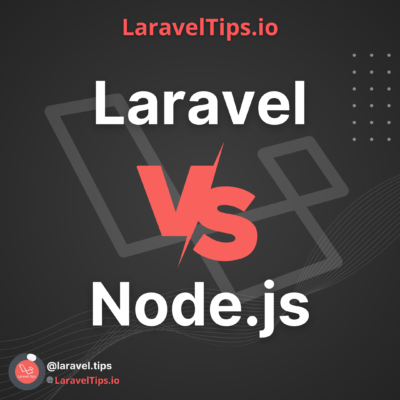Laravel Vs Node.js, Choosing the right technology stack for your next web development project can be a daunting task. There are numerous options available, each with their unique strengths and weaknesses. In this article, we will compare two popular web development technologies, Laravel and Node.js. We will delve into the pros and cons of each technology to help you make an informed decision about which one is right for your next project.
Quick comparison Laravel Vs Node.js
| Point | Laravel | Node.js |
|---|---|---|
| Learning Curve | Easy to learn, especially for developers with PHP experience | Steeper learning curve, especially for developers new to JavaScript |
| Performance | Slower than Node.js for CPU-intensive tasks, but faster for I/O operations | Fast and efficient for handling I/O operations, but can be slower for CPU-intensive tasks |
| Scalability | Scalable, but requires additional configuration and setup for horizontal scaling | Highly scalable, especially for real-time applications |
| Database Support | Supports both relational and non-relational databases | Limited support for relational databases |
| Built-in features | Comes with built-in authentication, routing, and templating | Does not come with built-in authentication or templating |
| Community | Large and active community, with a wide range of third-party packages and extensions | Large and active community, with a focus on real-time applications |
| Callbacks | Uses callbacks extensively, which can result in callback hell for complex code | Uses callbacks extensively, but also supports promises and async/await for cleaner code |
What is Laravel?
Laravel is a popular open-source PHP web application framework. It was created by Taylor Otwell in 2011 and has since become one of the most widely used PHP frameworks. Laravel offers a range of features, including easy routing, database migration, authentication, and templating, making it ideal for building complex web applications.
Pros of Laravel:
- MVC architecture: Laravel follows the Model-View-Controller (MVC) architectural pattern, which makes it easy to maintain and update the application’s codebase. This pattern separates the business logic, user interface, and data storage, making the code more organized and easier to understand.
- Built-in authentication system: Laravel comes with a built-in authentication system, which makes it easy to implement user registration and authentication functionality. This feature saves developers a lot of time and effort that would otherwise be spent on building custom authentication systems.
- Robust community: Laravel has a large and active community of developers who constantly contribute to its development. This community provides excellent documentation, tutorials, and resources, making it easy for developers to learn and use Laravel.
- Blade templating engine: Laravel uses a powerful templating engine called Blade, which offers a range of features like template inheritance, sections, and layouts. Blade makes it easy to create dynamic, reusable templates and helps to keep the codebase organized and maintainable.
Cons of Laravel:
- Slow performance: Laravel is slower compared to other PHP frameworks like Symfony and CodeIgniter. This slower performance can be attributed to the large number of features and functionalities that Laravel offers, which can cause performance bottlenecks.
- Steep learning curve: Laravel has a steep learning curve, especially for developers who are new to PHP frameworks. The framework has a lot of features and concepts that take time to master.
- Resource-intensive: Laravel requires a lot of resources to run. This can be a problem for small-scale projects or projects with limited resources.
What is Node.js?
Node.js is an open-source, cross-platform, back-end JavaScript runtime environment that runs on the V8 engine. It was created by Ryan Dahl in 2009 and has since become one of the most popular technologies for building scalable, high-performance web applications.
Pros of Node.js:
- Fast performance: Node.js is known for its fast performance, making it ideal for building high-performance web applications. The V8 engine used by Node.js compiles and executes JavaScript code at lightning speed, resulting in faster response times.
- Event-driven architecture: Node.js follows an event-driven architecture, which allows it to handle a large number of concurrent connections efficiently. This makes it ideal for building real-time applications like chat applications and online games.
- Large module library: Node.js has a large module library, which makes it easy to add new functionality to an application. This library includes modules for handling file system operations, network communication, and database access, among others.
- Scalability: Node.js is highly scalable, making it ideal for building applications that need to handle a large number of users. Its event-driven architecture and non-blocking I/O model make it easy to handle a large number of concurrent connections without compromising performance.
Cons of Node.js:
- Single-threaded: Node.js is single-threaded, which means it can only handle one task at a time. This can be a limitation for applications that require a lot of CPU-intensive tasks, as it can result in slower response times.
- Callbacks can be challenging: Node.js uses callbacks extensively, which can be challenging for developers who are new to the technology. Callbacks can result in callback hell, where the code becomes difficult to read and maintain.
- Limited support for relational databases: Node.js has limited support for relational databases, which can be a problem for applications that require complex data structures. Although there are libraries available for working with relational databases, they are not as robust as those available for other technologies.
Laravel vs Node.js: Which one should you choose?
When it comes to choosing between Laravel and Node.js, there is no clear winner. The decision depends on the requirements of your project and the skills and experience of your development team. If you are building a complex web application that requires a robust framework with built-in authentication and a large community, Laravel might be the better choice. On the other hand, if you need to build a scalable, real-time application with fast performance and a large module library, Node.js might be the better choice.
It’s worth noting that Laravel and Node.js can also be used together in a full-stack web development scenario. Laravel can be used for building the back-end API, while Node.js can be used for handling real-time events and data streaming.
Conclusion
In conclusion, Laravel and Node.js are both excellent web development technologies, each with its own unique strengths and weaknesses. Choosing the right technology depends on the specific requirements of your project and the skills and experience of your development team. By weighing the pros and cons of each technology, you can make an informed decision about which one is right for your next project.
FAQs
Q : What is Laravel?
A : Laravel is a free and open-source PHP web application framework that follows the Model-View-Controller (MVC) architectural pattern. It provides an elegant syntax and a range of features, including built-in authentication, routing, and templating.
Q : What is Node.js?
A : Node.js is a free and open-source JavaScript runtime environment that allows developers to build scalable, real-time applications using a non-blocking, event-driven I/O model.
Q : Which technology is better for building real-time applications?
A : Node.js is better suited for building real-time applications, thanks to its event-driven architecture and support for WebSocket. Laravel, on the other hand, is better suited for building web applications with built-in authentication and templating.
Q : Which technology has a larger community and more third-party packages?
A : Both Laravel and Node.js have large and active communities, with a wide range of third-party packages and extensions. However, Laravel has a larger community and a wider range of packages due to its longer history and wider range of use cases.
Q : Which technology is better for handling CPU-intensive tasks?
A : Node.js is better suited for handling CPU-intensive tasks, thanks to its non-blocking, event-driven I/O model. Laravel, on the other hand, is better suited for handling I/O operations.
Q : Which technology is easier to learn for developers?
A : Laravel is easier to learn for developers with PHP experience, while Node.js has a steeper learning curve, especially for developers new to JavaScript.
Q : Can Laravel and Node.js be used together in a full-stack web development scenario?
A : Yes, Laravel and Node.js can be used together in a full-stack web development scenario. Laravel can be used for building the back-end API, while Node.js can be used for handling real-time events and data streaming.
Recent Trending Tips
- Laravel Artisan: The Ultimate Guide to Creating Custom Commands
- The Ultimate Guide to Adding Real-Time Notification in Your Laravel Application
- Mastering Laravel: How to Easily Configure and Manage Multiple Database Connections
- How to Use Laravel Jobs and Queues to Improve Your Application’s Performance
- MySQL VS PostgreSQL: Which Database System is Right for Your Project?
Follow LaravelTips.io on Instagram
If you found this post informative, we encourage you to share it with your colleagues. We value your feedback and would love to hear your thoughts on our blog and social media posts across platforms such as Instagram, Facebook, LinkedIn, and Twitter.



